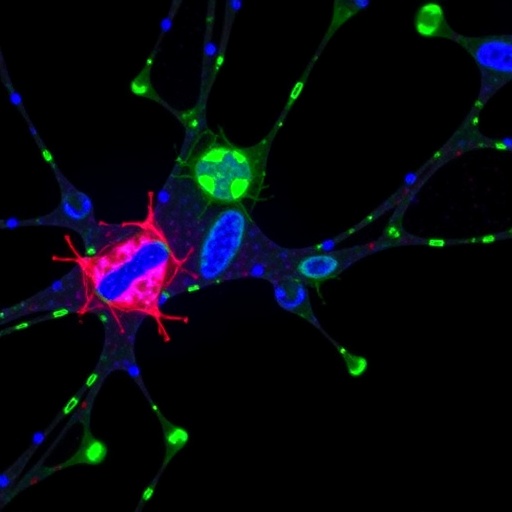In a groundbreaking study poised to reshape therapeutic strategies against pediatric liver cancer, researchers have unveiled a pivotal mechanism by which SKP2, an E3 ubiquitin ligase component, orchestrates the progression and metabolic reprogramming of hepatoblastoma (HB) cells. As the most prevalent and deadly malignant liver tumor affecting children, HB’s aggressive nature has driven scientists to explore novel molecular targets that could disrupt its relentless growth. This latest investigation delves deep into the molecular crosstalk between SKP2 and isocitrate dehydrogenase 1 (IDH1), exposing how post-translational modifications decisively influence the tumor’s cell cycle dynamics and glucose metabolism.
Hepatoblastoma’s rapid proliferation is intricately linked to the Warburg effect, a metabolic hallmark characterized by enhanced glycolysis even under aerobic conditions. This altered glucose metabolism supports not only tumor growth but also contributes to the creation of a microenvironment conducive to malignancy. By mining gene expression databases such as GEO, the researchers identified SKP2 as being notably upregulated in HB tissues compared to non-cancerous liver samples. They confirmed this elevated expression in patient-derived biopsies, underscoring the clinical relevance of their findings and positioning SKP2 as a candidate biomarker for HB.
Functionally, SKP2 is well-known for its role in cell cycle regulation through targeting various cell cycle inhibitors for ubiquitin-mediated degradation. However, this study pioneers insights into its non-canonical roles by demonstrating how SKP2 directs the ubiquitination of IDH1, an enzyme critical for cellular metabolism. Through co-immunoprecipitation assays, the team unequivocally established the physical and functional interaction between SKP2 and IDH1 within HB cells, suggesting a direct regulatory axis that links proteostasis with metabolic reprogramming.
.adsslot_B5o9jwxAtU{width:728px !important;height:90px !important;}
@media(max-width:1199px){ .adsslot_B5o9jwxAtU{width:468px !important;height:60px !important;}
}
@media(max-width:767px){ .adsslot_B5o9jwxAtU{width:320px !important;height:50px !important;}
}
ADVERTISEMENT
A particularly innovative aspect of the investigation was the application of IDH1 inhibitors in SKP2-suppressed hepatoblastoma models. The results showed that dampening IDH1 activity could counteract the tumor-suppressive effects triggered by the inhibition of SKP2. This finding illuminates the therapeutic potential of combinatorial targeting, wherein simultaneous modulation of SKP2 and IDH1 pathways may synergistically impede tumor progression. It also emphasizes the intricate feedback loops that sustain HB oncogenesis, which may be exploited to overcome resistance mechanisms inherent to monotherapies.
Moreover, animal models bearing HB tumors were employed to validate the in vitro results, enriching the translational value of the study. Tumor-bearing mice treated with SKP2 inhibitors exhibited significant decreases in tumor growth and metabolic activity, reinforcing the therapeutic promise of SKP2 blockade. This in vivo evidence is critical for establishing the feasibility of moving SKP2-targeting drugs into clinical testing phases, especially for children suffering from this aggressive disease.
The study also sparks new questions regarding the broader role of SKP2 and ubiquitin signaling in cancer metabolism. Given that IDH1 mutations are frequently implicated in other malignancies like gliomas and acute myeloid leukemia, understanding how SKP2-mediated ubiquitination affects mutant versus wild-type IDH1 could have broader oncological relevance. This line of inquiry may uncover universal therapeutic paradigms that transcend tumor types and metabolic contexts.
Importantly, the researchers employed an integrative approach combining bioinformatics, molecular biology, and advanced imaging to dissect the interplay between SKP2 and IDH1. This multidisciplinary methodology exemplifies how contemporary cancer research can unravel complex regulatory networks by leveraging the strength of diverse technologies. It sets a precedent for future studies aiming to bridge cell cycle machinery with metabolism in tumorigenesis.
Patient stratification based on SKP2 and IDH1 expression levels could further refine prognosis and treatment selection. By identifying subsets of HB patients with high SKP2 and IDH1 activity, clinicians might anticipate more aggressive disease courses and tailor therapies accordingly. This precision medicine approach ultimately aspires to improve survival rates and quality of life for pediatric patients challenged by hepatoblastoma.
Another facet worth exploring is the impact of SKP2-IDH1 regulation on the tumor microenvironment. Altered glucose metabolism often leads to acidification and immunosuppression within tumors, facilitating immune evasion. If SKP2 influences IDH1-driven metabolic flux, it may indirectly modulate immune cell infiltration and function, opening avenues for immunotherapy combinations.
The discovery that SKP2’s oncogenic capabilities extend beyond canonical degradation of cell cycle inhibitors to metabolic enzyme modulation redefines the protein as a master regulator of malignancy in hepatoblastoma. Targeting this multifaceted molecule could thus dismantle the tumor’s proliferative and metabolic underpinnings concurrently, offering a powerful therapeutic strategy that demands immediate attention in cancer research circles.
In summary, this seminal work elevates SKP2 to the forefront of hepatoblastoma research by illuminating its role as a critical modulator of cancer cell metabolism and cycle progression through the ubiquitin-mediated regulation of IDH1. The convergence of cellular signaling, post-translational modification, and metabolic rewiring underscores the complexity of cancer biology and the necessity for integrated therapeutic interventions.
As the scientific community digests these findings, clinical trials evaluating SKP2 and IDH1 inhibitors, alone or in combination, may become a focal point for advancing hepatoblastoma treatment. This study not only provides a mechanistic blueprint of tumor progression but also inspires optimism for children and families affected by this devastating disease.
Subject of Research: The study investigates the molecular role of SKP2-mediated ubiquitination of IDH1 in regulating the cell cycle and glucose metabolism within hepatoblastoma, the predominant pediatric liver cancer.
Article Title: SKP2 ubiquitylation modifies IDH1 to regulate hepatoblastoma cell cycle and glucose metabolism
Article References:
Yu, P., Li, J., Feng, W. et al. SKP2 ubiquitylation modifies IDH1 to regulate hepatoblastoma cell cycle and glucose metabolism. BMC Cancer 25, 1304 (2025). https://doi.org/10.1186/s12885-025-14644-5
Image Credits: Scienmag.com
DOI: https://doi.org/10.1186/s12885-025-14644-5
Tags: biomarkers for hepatoblastomacell cycle dynamics in cancerglucose metabolism in cancer cellsIDH1 role in hepatoblastomametabolic reprogramming in hepatoblastomamolecular mechanisms of hepatoblastomapediatric liver cancer researchpost-translational modifications in cancerSKP2 expression in liver tumorsSKP2 ubiquitin ligase in cancertherapeutic targets for liver cancerWarburg effect in tumors





